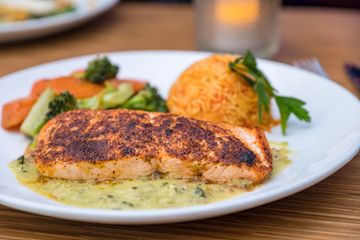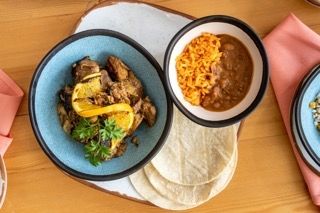Discover why churros are a must-try after every dinner
Is Mexican Food Healthy And Balanced? Unpacking the Nutritional Benefits of Typical Active Ingredients
The inquiry of whether Mexican food is healthy invites an expedition of its traditional active ingredients. Beans and corn work as fundamental staples, rich in healthy protein and fiber. Avocados offer useful fats, while various herbs and spices add flavor and wellness advantages - churros. Together, these parts produce a tapestry of nourishment. The healthfulness of Mexican cuisine commonly depends on preparation methods and section sizes. What duty do these aspects play in determining its general dietary worth?
The Power of Beans: Protein and Fiber-Rich Staples
Although commonly forgotten, beans serve as a cornerstone of Mexican cuisine, offering a wealth of nutritional advantages. Rich in healthy protein, they are a superb plant-based choice for those looking for to meet their nutritional healthy protein requires. This high healthy protein content sustains muscular tissue fixing and growth, making beans very useful for both vegetarians and meat-eaters alike. Additionally, beans are an extraordinary resource of nutritional fiber, which aids in food digestion and advertises a feeling of fullness, potentially aiding with weight monitoring.
The selection of beans utilized in Mexican dishes, such as black beans, pinto beans, and kidney beans, adds to a diverse taste profile and can improve meals nutritionally. Additionally, beans are low in fat and include necessary vitamins and minerals, consisting of folate, iron, and magnesium. With each other, these attributes make beans a critical active ingredient, providing both sustenance and nourishment in typical Mexican fare.

Corn: a Versatile Grain With Nutritional Conveniences
Corn stands out as a flexible grain essential to Mexican cuisine, celebrated not only for its culinary applications yet likewise for its remarkable nutritional account. As a key active ingredient in meals like tortillas, tamales, and pozole, corn offers essential nutrients that add to a well balanced diet regimen. Rich in carbohydrates, it acts as a significant power source, while likewise being reduced in fat, making it a positive option for numerous dietary requirements.
Corn is a good resource of nutritional fiber, which aids in food digestion and promotes satiation. It includes substantial amounts of vitamins such as B-complex vitamins, which are important for energy metabolic process. The presence of antioxidants, especially carotenoids, contributes to overall health and wellness by reducing oxidative stress. In addition, corn is gluten-free, catering to those with gluten level of sensitivities. In general, the nutritional advantages of corn underscore its significance in standard Mexican food and its duty in a healthy diet.
Avocados: Healthy Fats and Nutrients in Every Bite
Avocados play a substantial duty in Mexican food, complementing dishes with their velvety structure and abundant taste. Past their culinary allure, avocados are celebrated for their excellent dietary profile. They are an abundant resource of healthy and balanced monounsaturated fats, which can assist lower bad cholesterol degrees and support heart health. Additionally, avocados are loaded with vital nutrients, including potassium, vitamin E, and B vitamins, adding to general wellness.
The high fiber web content in avocados aids digestion and advertises satiety, making them an advantageous enhancement to any kind of meal. Their one-of-a-kind nutrient structure can additionally support skin health and wellness and provide anti-inflammatory benefits. Incorporating avocados right into standard Mexican dishes or appreciating them as a standalone treat can enhance both flavor and nourishment, demonstrating why they are a cherished staple in Mexican food. Generally, avocados use a tasty way to enjoy healthy fats and critical nutrients in every bite.

Natural Herbs and spices: Flavorful Health And Wellness Boosters
While enjoying the rich flavors of Mexican food, one can not ignore the essential duty that spices and natural herbs play in enhancing both preference and wellness. Components such as chili, cilantro, and oregano peppers not only add to the lively taste profile but additionally offer significant wellness benefits. Cilantro is recognized for its cleansing buildings, helping to remove heavy metals from the body, while oregano is packed with antioxidants and has anti-inflammatory effects.
Chili peppers, a staple in several Mexican dishes, include capsaicin, which has been linked to improved metabolic rate and discomfort relief. Furthermore, flavors like cumin and coriander assistance food digestion and might assist in blood sugar level regulation. Integrating these savory health boosters into dishes not only improves the cooking experience but likewise promotes total wellness, making Mexican food not simply delicious, but also nutritionally beneficial.
Conventional Cooking Techniques: Enhancing Nourishment and Taste
Conventional cooking techniques in Mexican cuisine play a necessary duty in improving both nutrition and flavor, as they typically prioritize time-honored methods and fresh active ingredients. Methods such as nixtamalization, where corn is soaked and cooked in an alkaline service, not just boost the nutrient account of tortillas but likewise boost their digestibility - happy hour. Additionally, making use of slow-moving cooking techniques, like cooking or braising, allows tastes to meld magnificently while maintaining the integrity of the components

Regularly Asked Inquiries
Are Mexican Food Portions Generally Larger Than Various Other Foods?
Mexican food portions are usually larger than those of many other cuisines. This characteristic shows standard eating techniques, highlighting communal sharing and hearty meals, which can lead to an extra considerable offering dimension on the whole.
Exactly how Does the Preparation Method Affect Healthfulness of Mexican Food?
Preparation approaches substantially affect the healthiness of Mexican food. Strategies such as barbecuing or steaming protect nutrients, while frying can increase undesirable fat material. Selections of components and cooking designs inevitably identify total nutritional value.
Can Mexican Food Be Tailored for Specific Nutritional Limitations?
Mexican food can indeed be customized for specific dietary constraints. Alternatives, such as using corn tortillas for gluten-free diet plans or incorporating more vegetables, enable individuals to enjoy traditional flavors while suiting various nutritional requirements.
What Prevail Misunderstandings Concerning Mexican Food and Health?
Common misunderstandings about Mexican food include the idea that it is inherently undesirable, excessively zesty, and only concentrated on fats. Actually, conventional dishes usually feature healthy ingredients and can be customized to numerous dietary requirements.
Are There Healthier Choices at Mexican Restaurants?
Healthier options at Mexican dining establishments often include smoked meats, beans, and fresh veggies. Choosing dishes that stress whole active ingredients and preventing heavy sauces can cause a much more healthy eating experience, promoting overall well-being.
The selection of beans utilized in Mexican meals, such as black beans, pinto beans, and kidney beans, contributes to a diverse flavor profile and can boost meals nutritionally. Avocados play a substantial role in Mexican food, complementing meals with their luscious texture and abundant flavor. Integrating avocados into standard Mexican recipes or enjoying them as a standalone treat can improve both flavor take out and delivery and nourishment, demonstrating why they are a cherished staple in Mexican food. While appreciating the abundant tastes of Mexican food, one can not forget the necessary duty that spices and natural herbs play in enhancing both taste and health. Conventional food preparation methods in Mexican cuisine play a crucial role in enhancing both nutrition and flavor, as they commonly focus on fresh active ingredients and time-honored techniques.